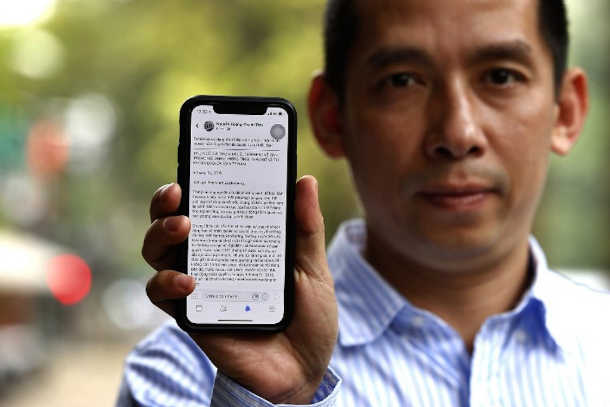
Vietnamese activist La Viet Dung holds up a phone with the screen displaying an open letter to Facebook chief Mark Zuckerberg in Hanoi on April 10, 2018. A group of 50 Vietnamese activists and rights organisations wrote an open letter to Facebook chief Mark Zuckerberg last year suggesting his company may be colluding with communist authorities to scrub out online dissent. (Photo by AFP)
Activists in Vietnam have pledged to ignore a controversial new internet law designed to control criticism of the communist government and curb the public's right to freedom of expression.
The cyber security law, which came into effect on Jan. 1, criminalizes criticism of the state and demands local internet service providers remove content regarded as "harmful" to the government.
Tech giants including Facebook and Google were also ordered last year to store their user data at offices inside the country.
Activists responded to this news by issuing the social media giant's boss Mark Zuckerberg with an ultimatum in July: 'don't comply with this series of draconian laws, or face a boycott.'
The state-run Tuoitre newspaper reported that since the start of the new year, internet users risk punishment if they engage in any activity seen as fighting the state, distorting the history of the communist revolution, spreading fake news, preventing internet forces from protecting cyber security, or posting secrets of the state, businesses, families or individuals.
The state-run Vietnam Journalists Association directed journalists not to produce or post writings, video clips or comments that challenge the policies of the Communist Party of Vietnam or the state on social media.
Lawyer Le Cong Dinh said the 43-article law allows the government to collect civilians' private date and curb freedom of expression, press and information, even though those rights are recognized by the country's constitution.
He said the government has effectively given itself the right to violate people's human and civil rights in the alleged interest of national defense and security, social order and safety, morality and community health.
"The government pretends to acknowledge human and civil rights to show [it cares about these] to the international community," the former political prisoner wrote in one Facebook post.
Dinh described the law as being unfair and unreasonable because it infringes on human rights. He called on people with a strong sense of moral duty to treat the law as if it did not exist, and even to violate it if necessary.
Father Anthony Le Ngoc Thanh, a rights activist, said the cyber security law aims to control people's thoughts in order to protect the government, not the public interest.
The priest said the law infringes on people's offline activities. In the future, the government will restrict the movements, social welfare and other interests of those who violate it, he added.
Rights advocate Pham Doan Trang said some Facebook users may fear having their accounts restricted, and they may be arrested for violating the new law.
However, she does not believe the government and its public security forces will gag activists.
Trang said on her Facebook account that it is impossible to ban internet services and silence the public because people "are familiar with and have become addicted to the internet and social media."
Internet service companies including Facebook and Google have no reason to give up on the Vietnamese government, she added.
She said the authoritarian government would never be able to completely control people's lives because it lacks the personnel and finances. Moreover, the public has grown distrustful of those who run the country, she added.
Trang said those with gripes against the Communist Party or the cyber security law would not be silenced, but would continue to post their thoughts and concerns about rights, democracy and injustice online.
This Southeast Asian country of 95 million people has around 60 million Facebook users. Local activists and dissidents use social media to promote and share materials on human rights and democracy despite the risk of being charged with spreading anti-state propaganda.
Vietnam-based Former Vietnamese Prisoners of Conscience reported that in 2018 at least 51 activists were given harsh prison terms.
Among these was the Catholic environmental activist Le Dinh Luong, who was handed a 20-year sentence for his activities. Most of those on the list were charged with spreading anti-government materials on social media.


